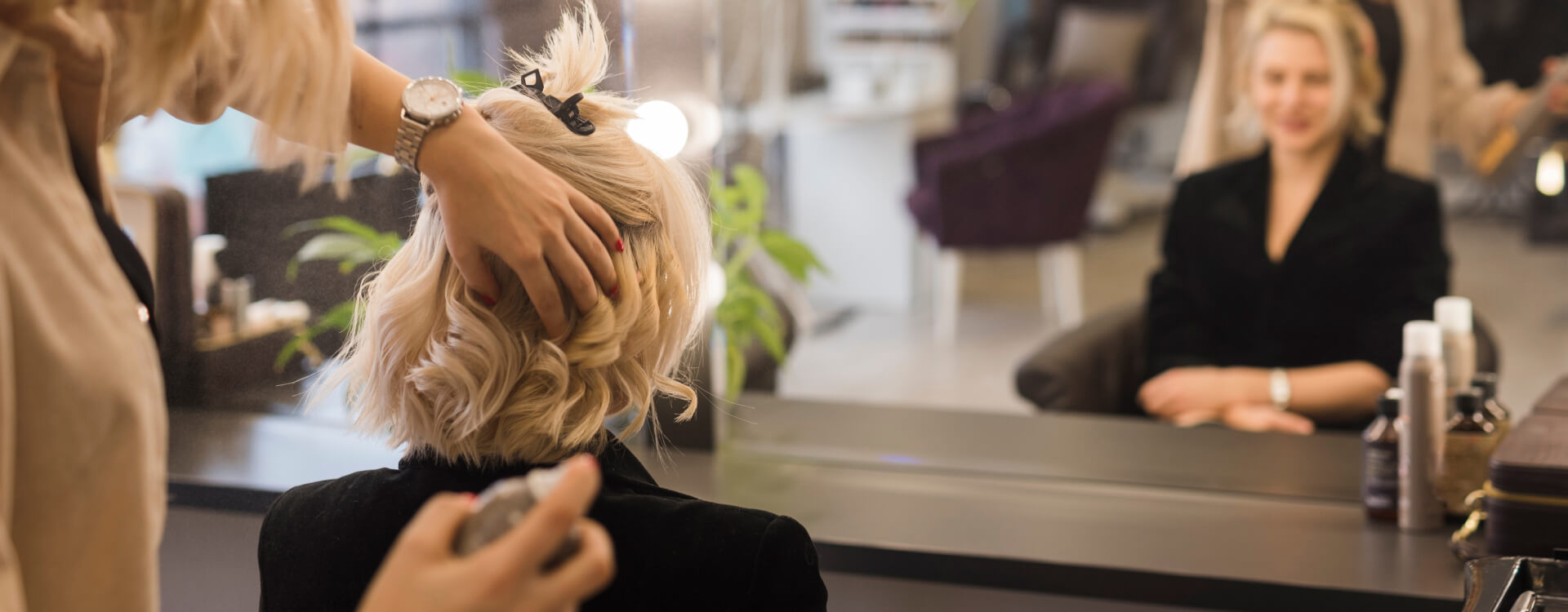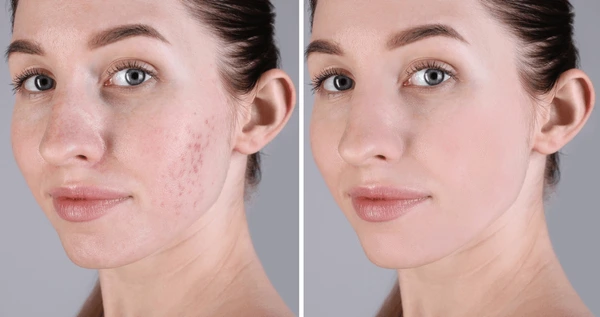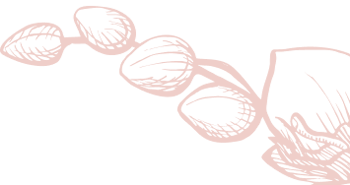Overview
Acne is a common, chronic inflammatory skin condition — affecting face, back, chest, shoulders — caused by blocked pores from excess sebum (oil) and dead skin cells. It may appear as whiteheads, blackheads, pimples, pustules, nodules or cysts depending on severity. Left untreated, acne can recur for years and may lead to scarring.
Acne often begins during puberty when sebaceous glands become more active, but it can affect people of all ages due to hormonal changes, stress, skin care habits, or use of greasy cosmetics.
At The Velvet Skin Centre, acne treatment is supervised by Dr. Asma Parveen, a qualified dermatologist in Lucknow with expertise in acne management and skin rejuvenation.
We offer a range of treatment modalities — from doctor-approved topical & oral therapies to advanced carbon-laser / light-based treatments — tailored to your skin type and acne severity. All procedures follow strict dermatology safety standards in a clean, professional clinical environment.
Our clinic’s multiple branches (Indira Nagar, Chowk, Thakurganj) make expert dermatological care accessible across Lucknow.
Dr. Asma offers the revolutionary Acne Treatment Treatment in Lucknow. This procedure combines carbon and laser technology to deeply exfoliate and rejuvenate the skin. It's ideal for oily skin, acne, and pigmentation issues. Carbon is applied, and a laser removes impurities while stimulating collagen. Dr. Asma's expertise ensures safe and effective results.
What is Acne
Acne is a chronic, inflammatory skin condition that provokes spots and pimples, particularly on the face, shoulders, back, chest, neck, and upper arms.
Whiteheads, blackheads, pimples, cysts, and nodules are all types of acne.
It is the most common skin condition in India, affecting up to 40 million Indians yearly.
It commonly happens during puberty, when the sebaceous glands start, though it can happen at any age. Acne is not dangerous, but it can leave skin scars.
The sebaceous glands produce oil. Acne is produced by men hormones produced by the adrenal glands in both gentlemen and ladies.
At least 90 per cent of people in India experience acne between 12 and 24 years.
Different Types of Acne?
If you have acne, you might notice a mix of pimple types.
Whiteheads and blackheads, referred to as comedones, are the most common acne lesions.
Blackheads, or open comedones, open at the texture of your skin. Oxygen in the air (not dirt) shows the top of these spots their darker appearance.
Whiteheads, or closed comedones, form as raised bumps under the surface of your skin. They remain flesh-coloured.
Inflammatory lesions, which are more likely to cause scarring of your skin, include:
Papules. These small, red, raised, inflamed or infected hair follicles cause bumps.
Pustules. These small red pimples have pus at their tips.
Nodules. These solid, often unhappy lumps develop under the shell of your skin.
Cysts. These large lumps beneath your skin contain pus and are usually painful.
Symptoms of Acne
Acne symptoms vary depending on the harshness of your situation:
Whiteheads (closed plugged pores)
Blackheads (open plugged pores)
Small red, tender bumps (papules)
Pimples (pustules), which are papules with pus at their tips
Large, solid, painful lumps under the skin (nodules)
Painful, pus-filled lumps under the skin (cystic lesions)
Acne usually occurs on the face, forehead, chest, upper back and shoulders.
Acne Treatment Options
Depending on acne type and severity, we offer:
- Topical treatments: retinoids, benzoyl peroxide, azelaic acid, and salicylic-acid–based serums/gels.
- Oral medications: recommended when required for moderate to severe inflammatory or hormonal acne.
- Carbon-Laser Therapy / Laser & Light Treatments: effective for deeper acne, oily skin, persistent pigmentation, or scarring — helps reduce sebum production, kill acne-causing bacteria, and accelerate healing.
- Combined approach: personalised dermatology-supervised plans combining multiple therapies for stubborn or recurrent acne.
- Lifestyle & skin-care counseling: guidance on non-comedogenic products, gentle cleansing, diet, hygiene, and healthy daily habits.
Causes of Acne
Depending on acne type and severity, we offer:
- Topical treatments: retinoids, benzoyl peroxide, azelaic acid, salicylic-acid–based serums/gels.
- Oral medications: prescribed when required for moderate to severe inflammatory or hormonal acne.
- Carbon-Laser Therapy / Laser & Light Treatments: especially effective for deeper acne, oily skin, persistent pigmentation or scarring — helps reduce sebum, kill acne-causing bacteria, and speed healing.
- Combined approach: a dermatologically supervised, customised plan for stubborn or recurring acne, combining multiple evidence-based therapies.
- Lifestyle & skin-care counseling: guidance on non-comedogenic products, gentle cleansing routines, and diet / hygiene / daily habits.
Prevention: Can acne be prevented?
Preventing acne is difficult, if not impossible, during normal hormonal changes. But some things can help:
Wash your face daily with warm water and a mild facial cleanser.
Routinely use moisturizer.
You don't have to stop using makeup, but try to use "non-comedogenic" products and remove makeup at the end of each day.
Keep your hands away from your face.
Frequently Asked Questions (FAQs) About Acne Treatment
-
When Should I See a Dermatologist for Acne?
If over-the-counter acne treatments and gentle face washing don't work for you, it's a good time to schedule an appointment with us. Cases of severe acne require a more aggressive treatment plan to prevent acne scars from occurring. We can determine the best method for treating your acne at The Velvet Skin Centre with Dr Asma, Dermatologist & Aesthetics Surgeon
-
What Acne Treatments Are Available?:
There are several acne treatments available based on your age, gender, and severity, among other factors. Mild or moderate cases of acne can be treated with topical creams or gels. Oral antibiotics or hormone-controlling medications can be effective for more inflammatory acne. Isotretinoin (Accutane) is a helpful tool for stubborn or severe acne. Other types of acne therapy can also be used, such as certain lights or Lasers like Fractional CO2. The Velvet Skin Centre utilizes a variety of acne treatment methods, so contact us today to schedule a consultation.
-
Can I get rid of Acne permanently?
Acne can often be controlled and managed. While no treatment guarantees permanent elimination (especially if hormonal or lifestyle factors persist), with proper medical care many patients achieve long periods of clear skin.
-
Which treatment is best for acne?
The best treatment for acne depends on its type, severity, and underlying cause. Mild acne often responds to topical treatments such as retinoids, benzoyl peroxide, salicylic acid, or azelaic acid. Moderate to severe acne may require oral medications, including antibiotics, hormonal treatments, or isotretinoin.
For deeper or recurrent acne, dermatologists may recommend chemical peels, light-based therapies, or carbon-laser treatments to reduce inflammation, oil production, and bacterial growth.
A dermatologist determines the most effective treatment after examining your skin, as no single method works for every patient.
-
What cures acne quickly?
No treatment can cure all acne immediately, but certain options offer faster improvement:
- Benzoyl peroxide reduces bacteria and inflammation within a few days.
- Topical retinoids help unclog pores quickly when used regularly.
- Professional extraction clears blackheads and whiteheads safely.
- Carbon-laser or LED light therapy can reduce active acne and oiliness faster than topical products.
- Oral medications may be needed for severe or widespread breakouts.
Quick results depend on the acne type. Consistent, dermatologist-guided treatment delivers the fastest and safest improvement.
If you're unsure what acne treatment is right for you, you can take an acne assessment with our medical team for impartial help and advice. The top priority is to identify the underlying causes of your acne to find the best way of curing it. If non-prescription treatments have not worked for you, now is the time to speak to us.
-
How do I stop my face acne?
To stop acne, you must address multiple triggers: oil production, clogged pores, bacteria, and inflammation. Effective steps include:
- Use a gentle, non-comedogenic skincare routine twice daily.
- Apply dermatologist-recommended treatments like retinoids, benzoyl peroxide, or salicylic acid.
- Avoid touching, picking, or squeezing pimples, which increases inflammation and the risk of scarring.
- Manage oil production with appropriate cleansers or in-clinic treatments such as chemical peels or carbon-laser therapy.
- Review your diet, stress levels, and hormonal factors, as these can worsen acne.
If breakouts persist, consult a dermatologist — long-term acne rarely resolves without a personalised medical plan.
-
How to tell if acne is hormonal or bacterial?
Hormonal and bacterial acne have different patterns:
Signs of Hormonal Acne:
- Appears along the jawline, chin, and lower cheeks
- Worsens around menstrual cycles
- Deep, painful cysts or nodules
- Often oily skin with persistent breakouts
- Common in adults, especially women
Signs of Bacterial Acne:
- Caused by P. acnes (Cutibacterium acnes) bacteria
- Shows as inflamed red pimples, pustules, or pus-filled lesions
- Often improves with benzoyl peroxide or antibiotic treatments
- Can appear anywhere on the face where pores are clogged
A dermatologist can confirm the exact cause and recommend the right treatment.
-
What are the first signs of hormonal acne?
Early signs of hormonal acne include:
- Breakouts concentrated on the chin, jawline, and neck
- Pimples that feel deep, painful, and swollen
- Increase in acne before menstruation
- Oilier-than-usual skin
- Breakouts triggered by stress, hormonal changes, or lack of sleep
- Acne appearing in adulthood despite no major teenage acne
Hormonal acne requires targeted treatments such as topical retinoids, hormonal therapies, or oral medications prescribed by a dermatologist.
-
What kills the bacteria in acne?
Acne-causing bacteria (Cutibacterium acnes) can be reduced or controlled using:
- Benzoyl peroxide — one of the most effective antibacterial agents for acne
- Topical antibiotics (clindamycin)
- Oral antibiotics for moderate to severe inflammation
- Chemical peels with salicylic acid or azelaic acid
- Laser or light-based therapies that reduce bacterial load and inflammation
- Consistent cleansing routine to prevent pore clogging
Dermatologists usually combine treatments to reduce bacteria while also addressing oil, inflammation, and clogged pores.


